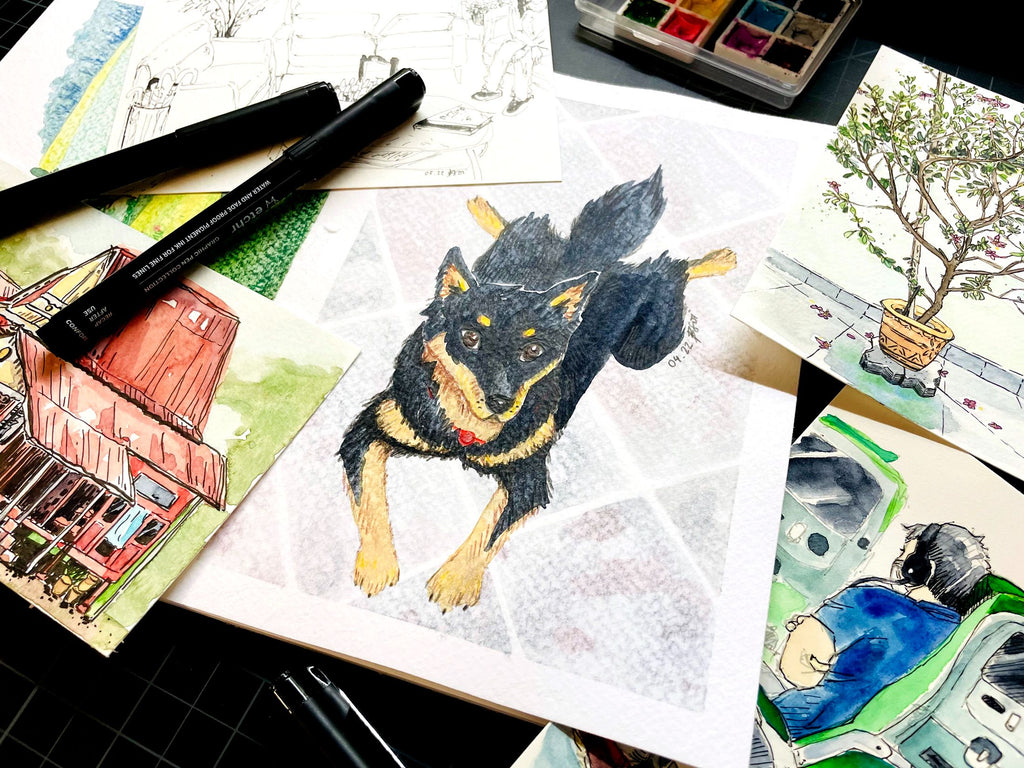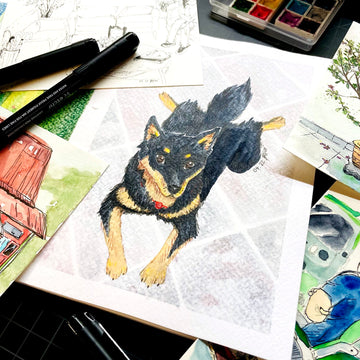They say art is a form of practise, like law or medicine, because it’s ever-changing. In addition, discoveries can be made and learned through practice.
So what’s a good way to stimulate those creative tastebuds? And what’s the easiest way to take your practice with you wherever you may be? I’ll share some of the tips I’ve learned, so I hope you find them useful for your practice!
Keep it Simple

One of the best tips I can give is to keep things simple, whether it’s your subject or your tools. For example, a simple pen and sheet of paper are enough to do some quick sketches, whether you’re on the bus or at the café.
They’re light and easy to carry around, although for your paper, I do recommend having some sort of clipboard or stiff cardboard to prop it up while you draw.
As for your subject, you don’t have to draw every single detail with pinpoint accuracy. Try to capture an impression instead, or draw using a time restriction (like 10-20 minutes) to keep your lines loose and free.
If you’re at the park, try considering drawing a single plant instead of the whole park, or perhaps a formation of rocks that interest you. If you want to draw the whole park, try to block out basic shapes, and draw one thing in focus that has more detail than the rest to give it more interest without going overboard.
Tip: If you’re getting bored of using a simple pencil or pen, switch to a brush pen or fountain pen. You can practise drawing weighted lines (i.e. thin vs thick lines), and produce a completely different feeling in your linework!
Don’t Be Shy

If you’re out and about, there’s a very high chance that there are other people around. They may even stop by to take a peek at what you’re doing.
If that happens, don’t freeze up or try to hide what you’re doing! It will affect your practice session, plus most people are watching simply out of curiosity.
You may meet the occasional person who comments on your work, whether it’s a compliment or a criticism. If it’s the former, smile and thank them.
If it’s the latter, smile anyway, and thank them for giving you pointers on how to practice better next time. The point is, don’t be ashamed of your art, and don’t let anyone make you feel that way either.
You may also want to consider joining or forming a group of other artists who want to practice, such as an urban sketchers group or watercolourist group. I find that this is an even more effective way to learn since you can bounce ideas and feedback off of each other!
There’s No Time to be Bored

A great time to practise is whenever you start to feel bored. Most people may fill their spare time with watching TV or scrolling through social media, but if you fill that time with art practice instead, then you’ll be accelerating your practice that much more!
For example, I’ve been on trips to visit relatives, and during the times when they were busy, I would go somewhere by myself and start drawing or painting. Alternatively, I would even draw them while they were doing something else!
So learn to spot these windows of time where you can practise. Even 5, 10, or 20 minutes are enough. The hard part is getting into this habit in the first place.
Organise Your Space…Or Not

I have a few artist friends who love working within their “organised chaos”, saying that tidiness interrupts their creative output and outlook. It might be true for some, but I’ve found that what gets me in the right mood and attitude to painting is if my space is clean and tidy.
I have lots of art tools that help keep them sorted and easy to access, and my paints and paper are always neatly kept but still within reach. This helps me keep focused on what I want to do and makes it easy to switch between different sets of tools.
If you’re unsure whether you’re the neat or messy type, try both ways, and see what works.
Just Have Fun

Last but not least is to have fun! What interests you? What observations have you made with your pencil? How do you want to capture the world around you? It’s always easiest to create when you have both inspiration and motivation, and when you’re feeling relaxed and happy.
Even if you’re tackling a subject you’re not as familiar with, keep in mind that it’s just practice. It’s not going to be on display for all to see, or for art critics to judge. The first step is to be willing to put pen (or pencil) to paper, and then the rest will follow.
Again, the emphasis is on “practice”. And like any practice, it’s best when it becomes a regular habit or a part of your daily routine that you can look forward to. But I hope I’ve shown you that it really doesn’t matter where you are – just make the time, or take the time, and go and make more art.
When was the last time you practised making art? Do you have any tricks that you’d like to share? Let us know in the comments below! If you’re interested in getting more tips, tricks, and general advice about creating art, subscribe to our email newsletter. You’ll be up to date with our latest product releases and flash sales, too!



7 comments
Great advise. I will try that.
Thanks for posting these tips. Making or taking time to practice
drawing was very interesting to me. I have had many opportunities to
draw outside when I’m traveling but still am hesitant. Getting into a
habit of making the effort is something I will work on. Thanks for
giving me some incentive to do that.